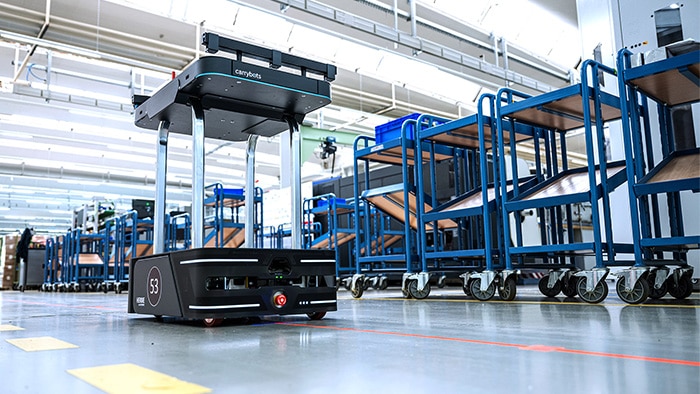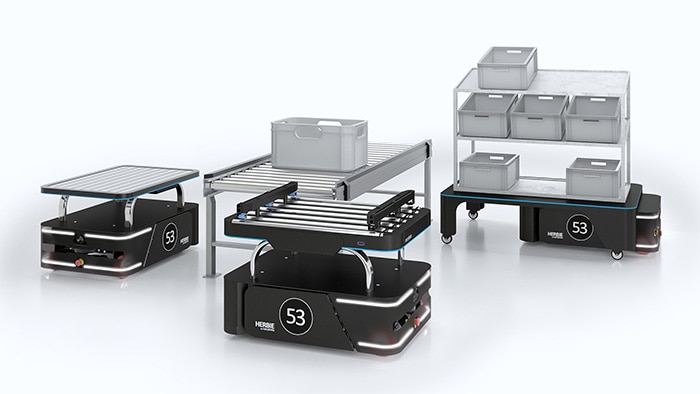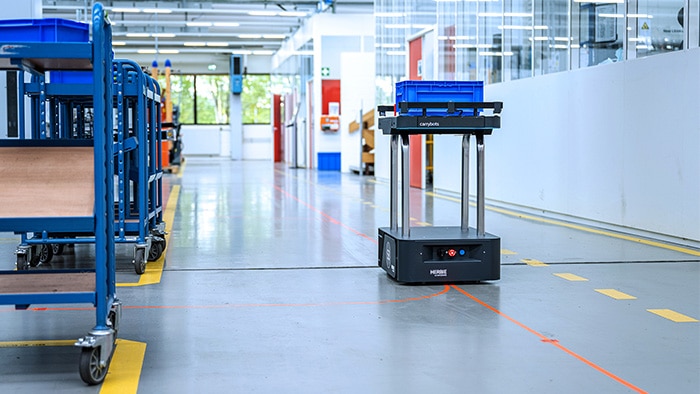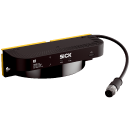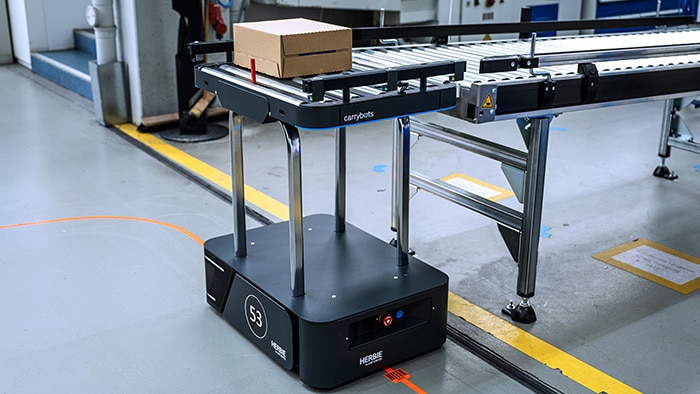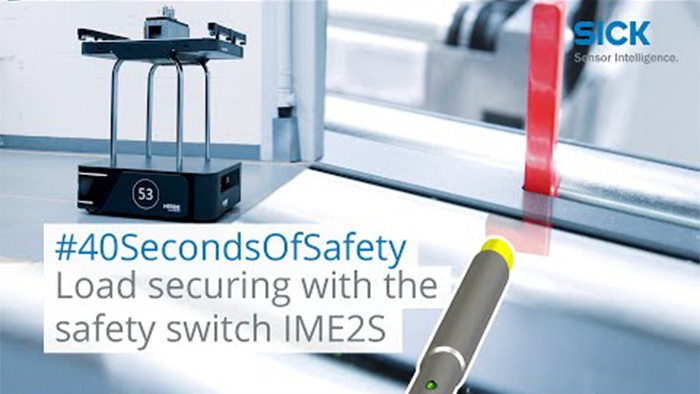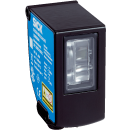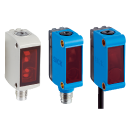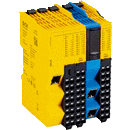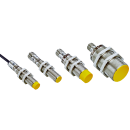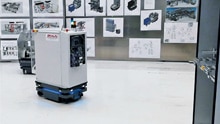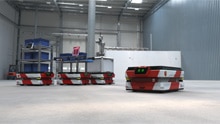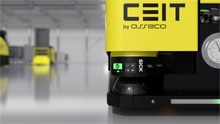The automation of logistics processes is gaining in importance – including in small and mid-sized companies. To remain competitive, they need affordable automated guided vehicle (AGV) system solutions that can be rapidly deployed. The HERBIE automated guided vehicle system from Carrybots meets all these criteria.
Cost-effective plug and play transport automation for small to mid-sized companies
We are currently seeing a strong push towards the automation of logistics processes. Companies in a wide variety of fields, for example electronics, injection molding, or even hospitals are endeavoring to automate their material flow. Of increasing importance in this area is the use of automated small vehicles that can perform transport tasks cost-effectively and simply.
The German manufacturer Carrybots has a vision: It would like to make high performance automation accessible to as many companies as possible, and pave the way for them into the age of Industry 4.0. “Our aim is to make the entry into transport automation as simple and cost-effective as possible,” says Marcel Meckes, Managing Director at Carrybots. To keep the barrier to entry as low as possible, Carrybots developed a small, modular-designed vehicle – HERBIE.
Maximum flexibility with HERBIE
HERBIE is an automated guided vehicle (AGV) system for the company-internal transport of small loads. At the heart of HERBIE is a base module that contains all of the required sensor technology and actuator engineering. Thanks to its modular design, four aspects of the base module can be tailored:
1. Top module: Various top modules can be combined. The most simple variant is a manual load-carrying unit where the goods are manually received and passed on. The most popular module currently is the roller conveyor AGV where the goods are fully automatically transferred by means of a suitable conveying technology. Custom solutions can, however, also be implemented.
2. Height: The height of the top modules can be customized depending on the requirements of the stations that HERBIE will be servicing.
3. Charging system: HERBIE is optionally available with a swappable rechargeable battery system or a fully automatic inductive charging system. This enables an optimal utilization of the vehicles and the available charging peripherals.
4. Software: The intuitive mobile web app offers not only an overview of the entire system but can also display individual vehicles so that any errors can be quickly and easily localized and eliminated.
HERBIE therefore offers great scope for customization. That makes it an affordable entry level solution – with maximum flexibility when requirements grow.
Innovative safety solution using SICK
Being an automated guided vehicle system, HERBIE moves about independently and shares the space with humans. Accordingly, it must be ensured that neither the AGV itself or its load poses a hazard to people. “The issue of safety was our highest priority from the outset,” says Meckes.
The objective was to find an innovative safety solution that would accommodate the requirements of line-guided small vehicles and the risk they pose, but without incurring productivity losses as a result of reducing the speed or load. To meet this challenge, Carrybots worked hand in hand with two partners early in the design phase: the company Gerhard Schubert GmbH as the end customer, and SICK as the technology experts. Meckes adds: “We have found SICK to be an experienced and competent development partner who not only possesses the correct industry-specific knowledge but also created a compromise-free, integrated safety concept for our HERBIE.”
During the course of their collaboration, SICK created a new safety solution for line-guided small vehicles. The new scanGrid2 played a crucial role in this.
With its scanGrid2, SICK has developed the world's first LiDAR multibeam scanner with rugged solid state technology that makes it possible to cost-effectively protect line-guided small vehicles up to performance level c (PLc). Thanks to scanGrid2, small vehicles like HERBIE no longer need to reduce their speed and load to drive around safely. In other words: the productivity increases. Florian Simic, Product Manager Industrial Safety at SICK, says “We support on the one hand the ever increasingly dynamic market environment and its requirements in the area of mobile applications. On the other hand, we enable our customers to implement innovative and intelligent solutions like HERBIE from Carrybots using the scanGrid2. In this way we are contributing to further industrial automation and the safety thereof.”
Very early on in their collaboration the partners exchanged ideas on the envisaged transport tasks of the vehicle and analyzed its safety-related and optical requirements. In general, safety solutions need to meet a variety of requirements depending on the hazards posed by the application. – mobile applications are no exception to this. When commencing development on the vehicle, Carrybots already had a clear picture of their target application and its integration into the existing work environment. This enabled SICK to contribute its expertise on the safety technology related requirements for protecting HERBIE very early on and to develop a tailored safety concept for this.
SICK is already a successful provider of PLb and PLd safety solutions. Having added the scanGrid2 to its product portfolio, SICK now has an optimally affordable PLc solution for mobile small vehicles.
Selecting the right technology is a crucial factor for success. The scanGrid2 with its solid state technology eliminates the need for rotating mechanical components. Thanks to their innovative design, the sender/receiver units are compactly housed in a single device with no moving parts. Besides a high level of ruggedness, this also ensures space-saving and easy integration of the device. With an unbelievably small installation height of just 43 mm, the scanGrid2 fits not only in virtually all types of small vehicles, but also optimizes the overall size of the vehicle. Every centimeter counts when it comes to designing this type of AGC!
HERBIE in action
The principle is simple: HERBIE stops at a station, takes goods on board, and transfers these to another station. Depending on its configuration, the goods can either be transferred manually, or the loading and unloading operations can be performed fully automatically using suitable conveying technology.
What does this process look like in detail?
HERBIE docks at the transfer station for loading. For a problem-free transfer, it is important that it be positioned correctly. Precise positioning is ensured with the help of the GL6 photoelectric sensor installed on the vehicle and a reflector on the transfer station. This sensor not only allows precise positioning of the vehicle at the loading and unloading station but also detects the transported goods on the vehicle. To enable the load to be picked up, the red stop pin facing the transfer station is lowered. There are two of these stop pins, one on each side of HERBIE. Their purpose, along with the guide rails, is to secure the load. As soon as the container is located on the loading tray, the stop pin is raised again. This change of position operation is safely monitored by an IME2S inductive safety switch. This non-contact safety switch reliably detects the position of a machine part up to performance level d (PLd). Only once both stop pins are located in their raised position can the AGV drive off.
Now it is time for the optical line guidance and grid localization, in short OLS, functionality to do its job. It guides HERBIE with the help of commonly available luminescent adhesive tape as well as barcodes on the unloading station. The OLS sensor is located underneath the vehicle. It reliable keeps the vehicle on the track regardless of the floor material or color and can transfer route information or driving commands to the vehicle controller based on the barcode. The Flexi Compact safety controller ensures a seamless coordination of all sensors. This device collects all the digital measurement data of the SICK sensors (scanGrid2, IME2S, GL6) and, based on these, controls the safety function of HERBIE. If, for example, a person or an object is detected by the scanGrid2 in the vehicle, the Flexi Compact triggers an immediate stop of the vehicle. As soon as the path is free again, HERBIE continues on its way again. After arriving at the destination, the load is transfered – either manually or fully automatically – at the unloading station.
Integrated safety concept for maximum performance
Using the automated guided vehicle system HERBIE from Carrybots and the innovative safety concept from SICK, small and mid-sized companies can automate their logistics processes in a simple, flexible and safe manner – with space at the top to accommodate future growth.
Read more
Ultracompact mobile robots optimize the process chain
Autonomy and flexibility in intralogistics – the road is clear for automated guided vehicles
Autonomous vehicles from Asseco CEIT – fully equipped with intelligent sensor technology
Mobile robots:
Move into new dimensions
Robotics is on the move, whether it be in production, logistics or service. Sensor solutions for all variants of mobile robots
